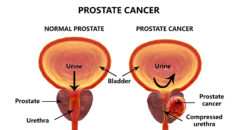 Prostate cancer can be a scary and uncomfortable topic to talk about as it is the most common form of cancer found in men. African American men have the highest risk of developing prostate cancer with as many as 1 in 4 men diagnosed with the disease. Not only are African American men more likely to have prostate cancer but they are at a higher risk for the disease to progress to advanced stages.
Prostate cancer can be a scary and uncomfortable topic to talk about as it is the most common form of cancer found in men. African American men have the highest risk of developing prostate cancer with as many as 1 in 4 men diagnosed with the disease. Not only are African American men more likely to have prostate cancer but they are at a higher risk for the disease to progress to advanced stages.
Other risk factors for prostate cancer include men over the age of 65, men who have a history of prostate cancer in their family and men who smoke. Although advanced prostate cancer can have negative implications, research from doctors shows that with treatment and changes in diet and exercise men can live long, fulfilling lives despite their diagnosis.
According to the American Cancer Society, prostate cancer begins when the cells in the prostate gland (which is only found in men) start to grow uncontrollably. Advancement in prostate cancer occurs when the cells begin to spread past the prostate to other parts of the body including the bones, brain, liver, lungs and lymph nodes.
Treatment for advanced prostate cancer often focuses on slowing or stopping the spread of the cancer cells. Hormone therapy is the standard treatment for advanced prostate cancer. Hormone therapy stops the hormones that contribute to cancer growth.
Other treatments that may be prescribed are chemotherapy which involves taking medication that kill rapidly multiplying cells, immunotherapy which involves building up the immune system cells to fight cancer more effectively, and other medications.
Dr. Idres J. Abdur-Rahman, board certified OB/GYN practicing in Chicago, says that diet and exercise have both been proven to extend the lifespan of men with advanced prostate cancer. “The Mediterranean diet and traditional Japanese diet have both been shown to increase longevity.”
The Mediterranean diet consists of primarily fruits and vegetables, legumes, nuts and whole grains. The Japanese diet consists of







